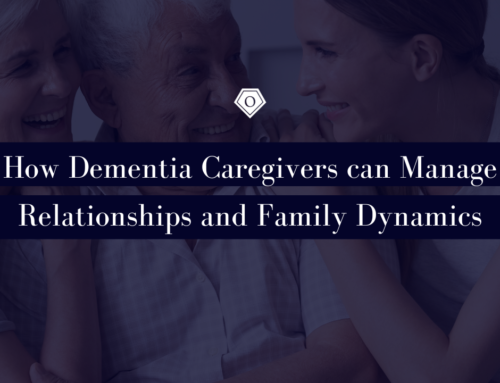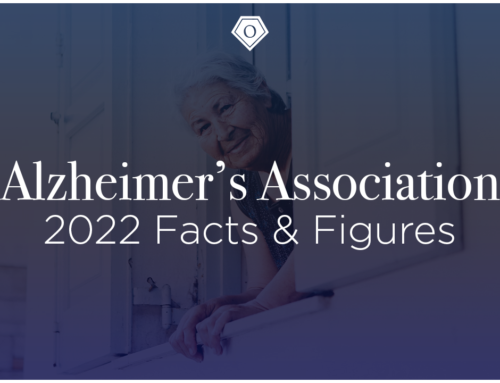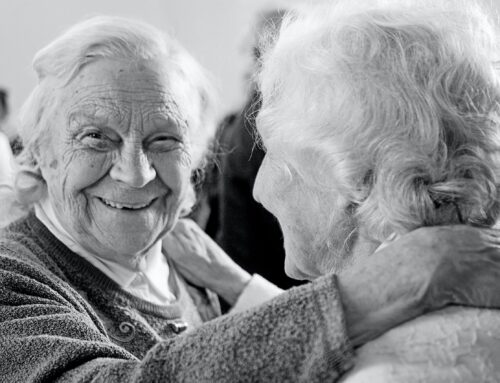Caring for a loved one with dementia can feel overwhelming.
Family members deal with the loss of the person they knew and the new reality of the disease, which causes agitation and cognitive impairment. These challenges can be heartbreaking.
Learning how to handle the difficult behaviors associated with dementia give you the ability to spend more quality time with your loved one and offer them a sense of security.
Stay Calm
It’s natural to mirror another person’s tone of voice and stress level.
However, it is important not to match anger or stress when a person that has dementia is agitated. While it may feel natural to speak louder when another person does, mirroring will only escalate the issue.
Instead, use mirroring to your advantage. Speak slowly, stay calm and use a reassuring tone of voice. Remember, their stress may be directed at you, but it is not personal. It is likely the disease that is causing distress or aggression.
Stop what you are doing and slow down. Listen carefully to what your loved one is saying, even when it doesn’t make sense. It may help you better understand their needs and de-escalate the situation.
When your loved one is finished speaking, be sure to ask permission for what you need to do next or offer help.
Focus on Feelings Not Facts
Dementia affects memory, personality and reasoning skills. Trying to argue with a person that has dementia will only frustrate you both.
Instead of focusing on words, focus on their feelings. It is frustrating for those with dementia to say what they need and feel. You may notice a pattern in their speech; they might say, “I need the car at the TV” and “The car is at the ball.” Try to provide reassurance by saying, “I will take you in the car today, and we will get what you need.”
Treating your loved one with dignity goes a long way in communicating safety and reassurance. Despite seeing behaviors of a child, they are an adult. It is the disease making communication difficult and causing changes in behavior.
Limit Distractions
Dementia makes performing tasks and communicating difficult. Distracting background noise, messy home, and bright lights can cause over stimulation.
Why not set your loved one up for success?
Remove non-essential items, distracting patterns and moving objects. Instead, fill living spaces with a few meaningful pictures that will provide reassurance.
Even lights can cause distress. Switch to dimmer lights in the afternoon or evening, and shut curtains during times of day when light might reflect off mirrors and startle your loved one.
When you see signs of agitation, simplify your surroundings and create a calming environment.
Check Discomfort
Difficulty communicating will make it hard for your loved one to express when they are feeling ill or uncomfortable.
Use these simple tips to address potential discomfort:
- When was the last time they ate? Could they be hungry?
- Could your loved one have an infection? Urinary tract infections and bladder infections can increase confusion, decrease mobility and cause agitation.
- Has your loved one had enough water? Dehydration is common in seniors due to a reduced sense of thirst. Dry eyes, mouth, and skin are symptoms.
- When was the last time they had a bowel movement?
- Is clothing causing discomfort? Tight waistbands can itch, shoes can cause blisters, and collars can be too tight.
Connect
Dementia is frightening and stressful for everyone involved, but the disease cannot steal the love from relationships.
Dementia care will be frustrating. Look for ways you can show appreciation for your loved one, look them in the eyes when they are talking even if they aren’t communicating clearly, listen to music together and do activities that activate their senses.
Enjoy the moments you have together. Express love through touch, sounds, taste and smell as these things are not affected by the disease.
If you are struggling to manage your loved ones needs, it may be time for home care. Our services allow you to spend more quality time with your loved one while leaving medical and personal care services to our professionals.






